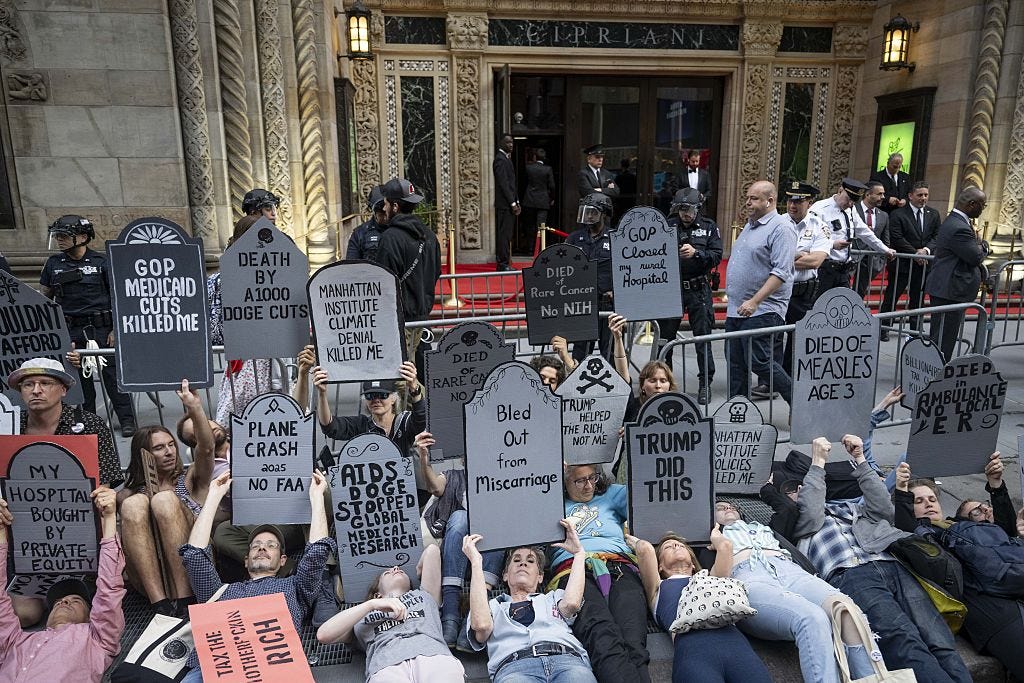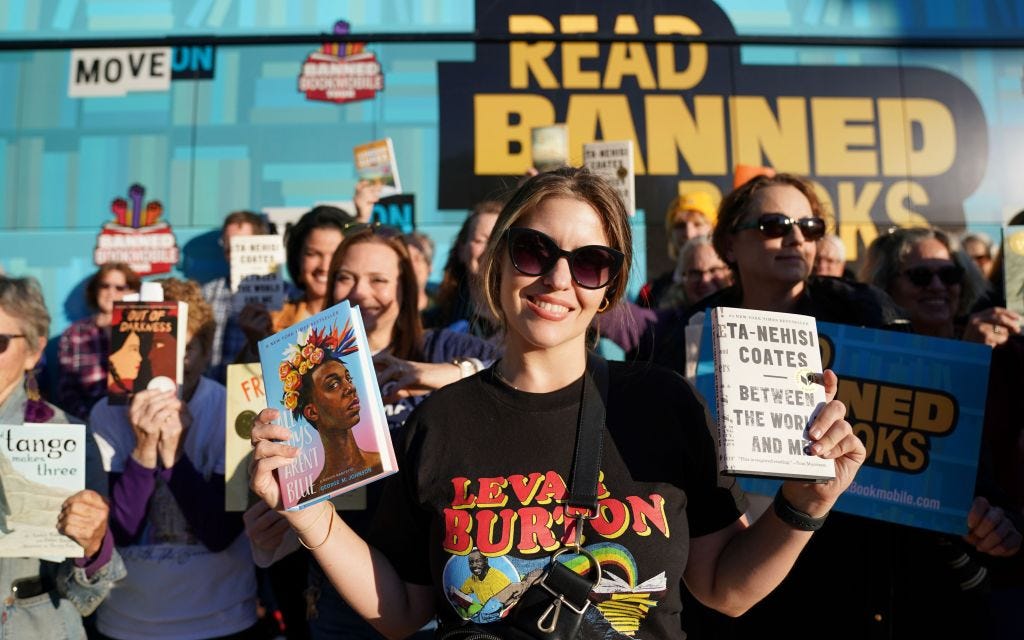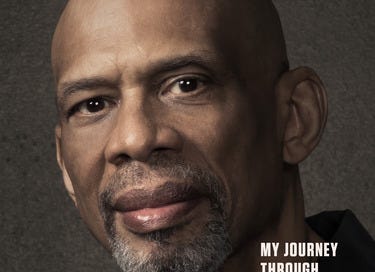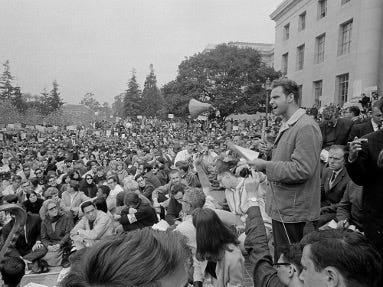Special Edition: Free excerpt from my new book, "We All Want to Change the World: My Journey Through Social Justice Movements from the 1960s to Today"
May 16, 2025
This week marks the publication of my new book, We All Want to Change the World: My Journey Through Social Justice Movements from the 1960s to Today. To celebrate, I’ve included an excerpt from the book and removed the paywall so anyone can read it. The section I’ve included is the opening pages of my chapter on free speech, the foundation upon which all other rights are built. Without free speech, a democracy cannot exist. Today, we see an aggressive campaign by the Trump administration to choke off every expression of free speech, including the press, education, the arts, and the judiciary. It is the most insidious and anti-democratic campaign I have experienced in my lifetime.
Before we get to the excerpt, I thought you might be interested in my CBS Mornings interview from yesterday.
The Free Speech Movement: “I’m Gonna Say It Now”
Oh I am just a student, sirAnd only want to learnBut it's hard to read through the risin' smokeOf the books that you like to burnSo I'd like to make a promiseAnd I'd like to make a vowThat when I've got something to say, sirI'm gonna say it now
Phil Ochs, “I’m Going to Say It Now”
So, what exactly are we talking about when we talk about free speech? The Free Speech Movement (FSM) that launched in 1964 at the University of California, Berkeley (UCB) was ground zero for most student activism of the sixties and seventies. Before this unprecedented campus uprising, the country’s interest in free speech was best described as the proverbial three wise monkeys who “see no evil, hear no evil, speak no evil.” When it came to issues like civil rights, the war in Vietnam, and other social and political issues, it was as if most of the country was on mute. The public’s Sphinx-like reserve was so pronounced that President Nixon declared silence a badge of honor: “And so tonight—to you, the great silent majority of my fellow Americans—I ask for your support.”
While those “silent majority” Americans mimicking the shy monkeys may have seen their passive support of authority as honorable behavior, those looking to extend personal, social, and political freedoms saw the unengaged public as cowardly, cowering in their La-Z-Boys clutching TV remotes, the only change they were willing to accept was changing channels between Bewitched and Gilligan’s Island. For a few years, the term “silent majority” became a popular pejorative used by activists to shame the uninvolved. The term remained fairly dormant after the seventies, but, like a pesky cold sore, it popped up again in 2020 as a call for conservative support when Donald Trump found his inner Nixon and tweeted: “THE VAST SILENT MAJORITY IS ALIVE AND WELL!!!” Perhaps. But Trump lost the election by about seven million votes. The majority broke their silence at the voting booth.
Free speech is unlike all the other protest movements in our history because it is so difficult to define exactly what it is. Can a server wear a Christian crucifix while working in a Muslim diner? Can a person wear a swastika while working at a Jewish deli? Can a White person publicly sing the n-word in a song written by a Black person? Can the ticket taker at a movie theater wear a campaign button promoting a candidate? Can a school force children to recite the Pledge of Allegiance? Can a pharmacist refuse to sell birth control pills if they are contrary to their own religious beliefs? These are the kinds of questions we struggle to answer when defining the boundaries of free speech.
The First Amendment to the U.S. Constitution doesn’t offer much help. Not only is it frustratingly brief, but it includes several major rights in the same sentences:
Congress shall make no law respecting an establishment of religion or prohibiting the free exercise thereof; or abridging the freedom of speech, or of the press; or the right of the people peaceably to assemble, and to petition the Government for a redress of grievances.
We are left to debate what constitutes “abridging”—which we have been vigorously and acrimoniously doing since the amendment was ratified in 1791. We are also made aware that the amendment only refers to the government restricting free speech, not all entities, including private businesses. The one thing most of us agree on: There is no such thing as absolute free speech in which anyone can say anything to anyone at any time. Our challenge for the past 230 years has been to make a distinction between what’s truly harmful and what’s merely offensive.
For example, the 1974 U.S. Supreme Court ruling in Smith v Goguen struck down the conviction of a teenager who had a small patch of the American flag sewn onto the back pocket of his jeans. At the time of his arrest, he was not involved in any protest, nor was he blocking traffic. He was merely chatting on the street with friends. The original jury found him guilty of flag desecration, and the judge sentenced him to six months in jail. Why was he arrested in the first place? Because the police took offence at the location of his flag at a time when anti-establishment protests were still popular across the country.
Though the case was decided based on the vagueness of the law, the real issue was freedom of speech. Clearly, Goguen’s flag was interpreted by the police as stating a political opinion that offended the arresting officer. Ironically, had Goguen said the words, “This country sucks,” the police wouldn’t have been able to arrest him. But his simple patch on his back pocket was a provocative scream in their faces. To the police, it was like wordlessly giving someone the middle finger. However, the cops chose to interpret that the patch was negative political commentary when it could just have been a sign of patriotism or merely a design choice. Today, designer Ralph Lauren sells an entire line of clothing featuring the American flag, including on pants. This is how the limitations of free speech evolve. One decade’s deep personal offense is another’s profitable commerce.

Our inability—or unwillingness—to put aside our personal biases and emotional triggers is what makes the discussion of free speech so difficult. Nevertheless, that is our mandate as American citizens. That’s what social critic Noam Chomsky meant when he said, “If you're in favor of freedom of speech, that means you're in favor of freedom of speech precisely for views you despise.”
There are necessary restrictions. We’re all familiar with slander and defamation laws that prohibit saying something untrue that damages another person or company. Three major cases in the past couple of years illustrate how necessary this restriction on free speech is, not just for individuals, but for the entire country.
In October 2022, a jury ordered Infowars founder Alex Jones to pay $965 million to the families of eight victims of the Sandy Hook Elementary School shooting that took 26 lives. His years of broadcasting lies that the shooting was a hoax and that the parents were paid actors, had done severe emotional damage to the families, including enduring relentless online harassment and death threats. This decision helped establish the limitations of conspiracy theorists to hide behind journalistic free press while saying whatever they wanted, despite the harm it caused.
In April 2023, Fox News settled a defamation lawsuit for $787.5 million for deliberately spreading lies about the 2020 presidential election. In December 2023, former New York City mayor and Trump attorney Rudy Giuliani was ordered to pay $148 million for defaming mother and daughter election workers by accusing them of election tampering. He offered no evidence to support this claim, yet both women were targeted with threats of violence and death. They continued to be threatened even after they won their case against Giuliani.
All three of these cases were politically—and financially—motivated. They were aimed at an audience who is already skeptical of government interference and therefore easy to goad with lies. Jones claimed that Sandy Hook was staged in order for the government to confiscate private citizens’ guns, a dog whistle issue among conservatives that helped him earn more than $165 million over three years.[v] His legacy for those years—aside from the pain he caused the grieving parents—was to stir suspicion and resentment against the government.
In some ways, Fox News and Giuliani’s misdeeds are even worse. They acted like that guy in old Western movies who buys drinks for everyone in the saloon. Then, when they’re liquored up, whip them into a frenzied mob to go lynch the kid in the jail, all the while knowing the kid is innocent because the mob leader himself is the actual killer. The constant lies about election fraud have a long-term and dangerous effect on the country because they undermine the integrity of a presidential election.
Trusted elections are the foundation of democracy. When the people don’t trust them to be fair, then they can’t trust the government at all. Then democracy is dead. If democracy in the United States falters, then democracies around the world will be weakened and may also crumble. Worse, both Giuliani and Fox News did it for the money. Fox was trying desperately to win back its declining audience, who felt Fox News wasn’t conservative enough. Giuliani was trying to stay on Trump’s good side, which seemed to work because in September 2023, Trump hosted a $100,000-a-plate dinner to raise money for Giuliani.
In none of these cases were the guilty parties stifled from saying whatever they wanted. All the lawsuits asked them to do was offer evidence that their accusations were truthful. None could. In cases like this, free speech is not being harmed—quite the opposite. It is demanding that free speech not be unjustly or inaccurately used as a weapon against innocent people or even the country.
Free speech does not include threatening someone with bodily injury. Every state has laws against assault. If you watch a lot of crime shows, you’re familiar with the crimes of “assault and battery.” What many people do not know is that battery is to physically attack someone, while assault is to verbally threaten someone, causing them to reasonably fear imminent harm. If someone is making a fist and threatens to punch you in the face, that is assault, even if they don’t actually do it. That kind of speech is not free.
Yet, the First Amendment does protect hate speech—expressions used to denigrate or ridicule someone based on their race, gender, gender identity, ethnicity, sexual preference, or national origin. However, it’s important to remember that First Amendment free speech protections only relate to government interference. Private enterprises may regulate as they see fit. That’s why there is so much pressure from much of the public for social media sites like X and Instagram to police their content to block hate speech.
The price of democracy is eternal vigilance. Nowhere is this oft-quoted warning more apt than in safeguarding free speech. The assault on this freedom occurs daily in many different guises, often from those who proclaim their love for and devotion to freedom of speech. One of the most popular ruses to disembowel freedom of speech is to claim they’re “protecting the children.”

The problem with this misdirectional ploy is that it relies on the public’s knee-jerk reaction to wanting to protect children to prevent them from examining if they actually are, or if they are more likely to harm children. The shocking rise in book banning in school libraries in the past few years has been justified as necessary to protect children from exposure to issues regarding race, LGBTQ+, and religion. From July 1, 2022, to June 30, 2023, there were at least 3,362 instances of book bans in U.S. public school classrooms and libraries. This involved 1,557 book titles being banned from over 1,480 authors, illustrators, and translators. According to PEN America, the authors most often banned were female, people of color, and/or LGBTQ+ individuals.[viii] Also banned were books that discussed slavery, described daily life among Black families, or even featured Miles Morales, the Afro-Latino teenage Spider-Man.
This will not protect children but will further isolate those marginalized children whose lives are being disregarded and denigrated. Also, those children who are not exposed to accurate accounts of history will not be as well educated as other children. They will also be less exposed to the lives of other groups. Studies have confirmed that those who read fiction are more empathetic toward others, better understanding them and sharing their feelings.
Judge Stephen Locher explained just how damaging, rather than protective, book banning laws can be when he approved a preliminary injunction on Iowa’s 2023 book banning law: “The law is incredibly broad and has resulted in the removal of hundreds of books from school libraries, including, among others, nonfiction history books, classic works of fiction, Pulitzer Prize winning contemporary novels, books that regularly appear on Advanced Placement exams, and even books designed to help students avoid being victimized by sexual assault.” He argued that the law was so vague that “every school district and elementary school teacher in the State has likely been violating it since the day the school year started.”[xi] These laws are deliberately vague, allowing officials to prosecute teachers for pretty much anything. Teachers are then too intimidated to teach anything they fear might be interpreted as offensive. This has devastating consequences for teachers and students. Florida, which has pioneered book banning and anti-critical race theory programs, faces one of the worst teacher shortages in the country, with about 8,000 vacancies for teachers and 6,000 for support staff. The Florida Education Association blames political interference along with low pay (Florida ranks 48th in the country in average teacher pay). Not exactly “protecting” the children.
So why would parents and school officials deliberately handicap their own children with the vigor of Kathy Bates to James Caan in Misery?
One major goal of restricting free speech is to prevent people from hearing ideas that are contrary to their own. The fear is that if they hear these ideas, they might be persuaded that you are wrong, and this other voice is right. The rational person would try to persuade their audience with facts, statistics, experts, and logic. The irrational person prefers to prevent the audience from hearing dissent. The British practiced this policy when they made it illegal for the American colonists to criticize the British government or its officials. Before 1700, the British prosecuted 1244 people for seditious speech, the punishment for which could include public whippings, being locked in stocks, or even having ears cut off. That harsh treatment is one of the reasons Americans enshrined free speech in the Constitution.
For parents eager to ban books, they hope to keep their children from straying away from whatever values they have instilled from birth. Their hope is that by keeping the kids away from ideas, concepts, and even facts, they can keep their kids away from forming opinions and values contrary to their own. It is a form of intellectual imprisonment.
I like this denial of ideas through books to the treatment of nineteenth-century Hungarian obstetrician Ignaz Semmelweis, who discovered that unwashed hands from doctors were causing patients to get sick or die. He imposed a one-year hand-washing policy for physicians in the labor room, resulting in an unprecedented drop in maternal mortality from 18% to less than 2%. Despite the evidence, the medical community rejected his new ideas, some insulted by the idea that their hands were unclean, and he was fired. He suffered a nervous breakdown and was committed to an asylum by his colleagues, where he was beaten by guards and died fourteen days later.[xiv]
Likewise, parents who tout the glories of American free speech reject free speech through books despite no evidence that children are harmed but plenty of evidence that they are helped. One incident exemplifies the hysteria that has turned schoolrooms and libraries into warehouses for conservative thought. In November 2023, Lanah Burkhardt, 20, testified before the Conroe Independent School District in Texas that “Getting rid of Scholastic Books and their book fairs will inevitably protect kids.”
She then related the story of how, when she was eleven, she read a graphic novel, Drama, from Scholastic that featured a single chaste kiss between two young boys. That kiss, she claimed, led to her porn addiction, which ended when she was thirteen when she was suicidal. Powerful stuff. Enough to rally parents to ban Scholastic! Except for the lies. Burkhardt was homeschooled and therefore probably wouldn’t have attended a Scholastic Book Fair. Even if she did, it would have been with a parent. Also, why ban the entire book fair as well as all Scholastic books, which include Harry Potter novels and many informative science and history books? More importantly, Burkhardt failed to disclose that she worked for a rival company of Scholastic and had a professional interest in getting Scholastic banned.[xv] It also begs the question of why this particular illustration triggered an eleven-year-old’s interest in porn. Of course, there is no evidence that she truly was addicted to porn. Just her dubious word.
Unfortunately, it is this kind of anecdotal “evidence” that school boards across the country use to ban books because their goal isn’t to reach a reasoned decision; their goal is to ban books, even on the flimsiest excuse. The real lesson learned by the children they are trying to “protect” is that parents and people in authority make decisions based on faulty information and bad logic.

Democracy depends on an informed populace to make rational decisions about the laws that will govern people and set a course for the country’s future. Decisions made based on irrational biases most certainly lead to catastrophic mistakes. One only has to read all the justifications—moral, biblical, “scientific”—to understand just how easy it is to go wrong. Prior to the Civil War, the Bible was routinely used to justify slavery: In Ephesians 6:5–8, Paul says, “Slaves, be obedient to your human masters with fear and trembling…” During this time, well-regarded physician Samuel A. Cartwright told the Medical Association of Louisiana that he had identified why slaves want to run away, even giving it an officious Greek name: drapetes (runaway) mania (madness). Cartwright explained the cure: Because of their smaller brains and blood vessels, Negroes tended toward indolence and barbarism. But this could be cured by keeping them in a benevolent state of submission, awe, and reverence, as God had ordained.
Free speech, sure. Smart speech, not so much.
But free speech doesn’t have to be smart because it’s the process by which we’re supposed to arrive at smart. We offer opinions, we present evidence, we counter-argue, we refute evidence, provide better evidence. In the end, free speech should help us form the best opinions so we make the best decisions.
In theory.
[The book is available at your local bookstore or you can order it here.]
Kareem’s Jukebox Playlist on Rewind
Marvin Gaye: “Inner City Blues” (1971)
Every time I read the news, this song immediately pops into my head. I know I’ve featured this song before, but it’s time to listen to it again. The lyrics are about how the government ignores the needs of those most in need, but gives tax breaks to the wealthy.
Oh, make me want to holler
The way they do my life (yeah)
Make me want to holler
The way they do my life
What’s changed in 54 years since this song was released? Those who benefit from inequity don’t want change, they want to fight as hard as they can for the status quo. The rest of us can’t just holler about it—we have to change things. Rather than whistle while we work, we holler while we change.






Kareem, you've changed my life on the deepest level because your words to me in 1977 changed the way I spoke to myself.
Before we stepped onto the TV stage together on Hour Magazine with Gary Collins, I shared my pitiful basketball story with you.
In one sentence, you shifted the way I thought. I had been counting the wrong things... the number of times I missed rather than the number of times I scored.
Today, I pray that our country hears and speaks up together.
Thank you from the bottom of my heart.
My book came yesterday. I am so excited. I put it on my coffee table for everyone to see. Since I came across your newsletter on substack maybe a couple years ago it’s kept me sane and helped me to keep growing even as I age. The bonus is you’ve mixed your wisdom with amusing videos and the music I grew up on. Life saving in a very tough era.
BTW I was proud to sit with a group of my Philadelphia friends recently and write thank you notes to the Eagles players who had the courage to stand up against the vile rhetoric of our unfit president and refuse to bend the knee for what else was that but a photo op of adulation.